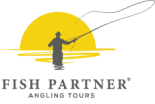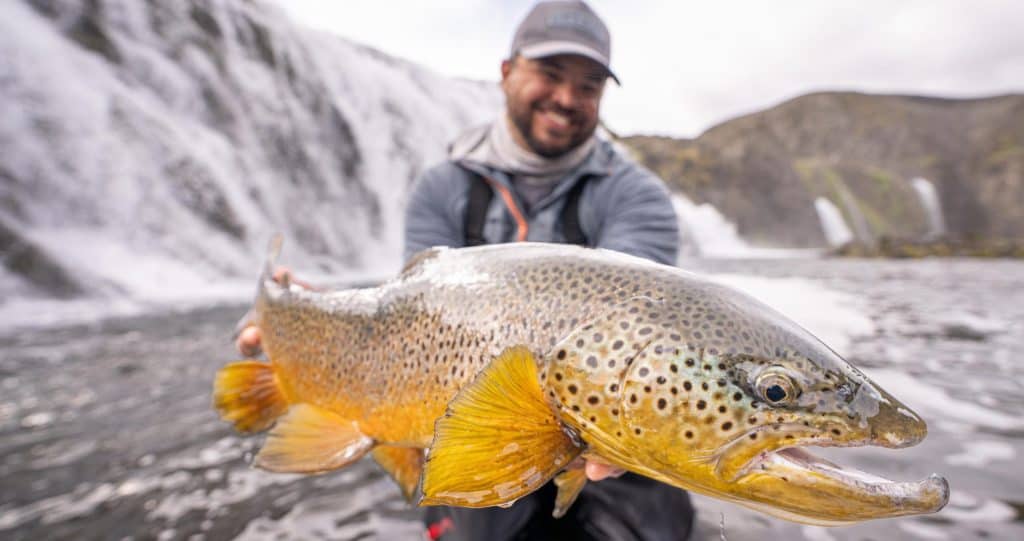Iceland is one of the most unique fly-fishing destinations in the world, a place where wild rivers, crystal-clear spring creeks, and glacial lakes hold some of the planet’s most powerful trout and salmon.
Every year, anglers travel from across the globe to experience its unspoiled landscapes and incredible fis, from the ancient brown trout of Lake Þingvallavatn and the bright sea-run browns of the South Coast, to the Arctic char of the Highlands.
If you’re planning your first trip, or returning for another adventure, this FAQ covers everything you need to know: when to come, what species to target, licenses, gear, clothing, and where to fish
To help plan your next trip, here’s a complete FAQ covering everything from licenses and gear to the best time to visit.
Use the quick links below to jump straight to the most common questions about fly fishing in Iceland:
Quick Links
- When is the fishing season in Iceland?
- What species can I fish for?
- Is there fishing in Iceland during winter?
- Do I need a fishing license in Iceland?
- Where can I buy a fishing license?
- Can I bring my own fishing gear to Iceland?
- Can I rent fishing gear in Iceland?
- What flies work best in Iceland?
- What should I wear for fishing in Iceland?
- Where are the best places to fish in Iceland?
- Can I fish without a guide?
- Is fishing in Iceland environmentally friendly?
- Why is Iceland famous for fly fishing?
- Ready to plan your trip?
When Is the Fishing Season in Iceland?
The fishing season in Iceland runs roughly from April through October 20, though exact opening and closing dates vary between rivers and lakes.
- April–May: Prime time for trophy brown trout on Lake Þingvallavatn and for sea trout on the South Coast.
- June–August: Peak summer for Arctic char and brown trout in the Highlands, plus Atlantic salmon across the country.
- September–October: Prime time for sea run brown trout
Summary: Iceland’s fishing runs from April to October 20, with the biggest trout early and late in the season, and prime char and salmon fishing mid-summer.
Read more in our full guide to Fishing Seasons in Iceland.
What Species Can I Fish for in Iceland?
Iceland offers four main freshwater species:
- Brown Trout: Native “ice-age” strain found in lakes and rivers nationwide.
- Arctic Char: Abundant in both lakes and rivers, superb on dries in midsummer.
- Sea Trout: Sea-run browns that can exceed 100 cm (39 in)
- Atlantic Salmon: World-famous salmon fishing throughout the country.
Summary: Five freshwater species dominate Iceland’s fisheries: brown trout, Arctic char, sea trout, sea run arctic char and Atlantic salmon — each thriving in different regions and seasons.
See our detailed Species Guide to Icelandic Fish.
Is there fishing in Iceland during winter?
Almost no winter fly-fishing is available, most rivers and lodges close for the season.
However, some ice-fishing opportunities exist for locals and visitors on select lakes when conditions allow.
Do I need a fishing license in Iceland?
Yes. All anglers must hold a valid day pass or license for the water they wish to fish.
Most rivers and lakes are privately leased, and access is controlled by permits sold per rod per day.
A few season-long passes are available for certain lakes, including the Fish Partner Members Club and Veiðikortið (The Fishing Card), which offers access to many smaller lakes across Iceland.
Summary: Every water in Iceland requires a valid license; most are sold per-day per-rod, though some lakes have affordable season passes.
Where can I buy a fishing license?
Licenses and day passes can be purchased directly from Fish Partner, other local outfitters, or leaseholders.
Can I bring my own fishing gear to Iceland?
Yes, but all equipment must be disinfected before use in Iceland to prevent the spread of aquatic diseases.
You can complete this:
- At a veterinary clinic before travel,
- At customs upon arrival, or
- At fishing lodges such as those operated by Fish Partner.
Be sure to have a valid disinfection certificate ready when entering the country.
Summary: All rods, waders, and nets must be disinfected before fishing in Iceland — either at customs, a vet clinic, or a lodge.
Can I rent fishing gear in Iceland?
Yes. Fish Partner offers high-quality rental rods, reels, waders, and flies for clients coming on guided trips, perfect for travelers who prefer to pack light.
Several fly shops in Reykjavík offer gear rental for those doing DIY fishing.
What flies work best in Iceland?
It depends on species, water, and season, but Icelandic fish usually respond well to natural, subtle patterns.
Explore our full fly guides:
Streamers
Nymphs
Salmon flies
What should I wear for fishing in Iceland?
Icelandic weather is famously unpredictable. Always pack layers and waterproof gear:
- Breathable waders and boots
- Warm base and mid-layers
- Waterproof jacket
- Hat, gloves, sunglasses
- Windproof shell — rain, wind, or even snow can appear at any time of year
Summary: Icelandic weather can shift from calm sun to sleet in an hour; dress in layers and waterproof outerwear year-round.
See our detailed gear list
Where are the best places to fish in Iceland?
Top fishing areas include:
- Lake Þingvallavatn: Home of the legendary ice-age brown trout
- The Highlands: Remote rivers with wild brown trout and Arctic char
- South Coast Rivers: Epic sea-trout action in spring and fall
- Northwest Rivers: Classic Atlantic salmon fishing on rivers like Laxá and Blanda
Fish Partner operates lodges, day trips, and DIY programs across all of these regions.
Can I fish without a guide?
Yes, DIY fishing is possible and popular, especially on lakes and smaller rivers.
That said, hiring a guide dramatically increases success and provides local expertise on water conditions, hatches, and fish behavior.
Summary: DIY fishing is possible, but a local guide’s knowledge often makes the difference between a good day and a great one.
Is fishing in Iceland environmentally friendly?
Yes. Iceland’s fisheries are built on sustainable, catch-and-release management.
Strict limits on rod numbers and habitat protection keep fish populations healthy for future generations.
Why is Iceland famous for fly fishing?
Because nowhere else combines such spectacular landscapes, pure water, and wild fish so close to the Arctic Circle.
Fishing in Iceland is as much about the experience as the catch: solitude, adventure, and the raw beauty of the land.
Ready to plan your trip?
There’s no place like Iceland for fly fishing: Wild landscapes, crystal-clear rivers, and fish that test every skill you have. Whether you dream of trophy browns on Þingvallavatn, sea trout in the South, or char in the Highlands, our team at Fish Partner can help you build your perfect adventure.
Get in touch today to start planning your 2026 trip.
Written by Sindri Hlíðar Jónsson, Co-Owner of Fish Partner. With over a decade of experience guiding and managing fisheries across Iceland, Sindri has helped hundreds of anglers discover Iceland’s unique fly-fishing destinations.
Sindri Hlíðar Jónsson

